Liminality Film
“Loneliness has followed me my whole life. Everywhere. In bars, in cars, sidewalks, stores, everywhere. There’s no escape. I’m God’s lonely man... June 8th. My life has taken another turn again. The days can go on with regularity over and over, one day indistinguishable from the next. A long continuous chain. Then suddenly, there is a change.”
The movie follows a twisted character who is unable to integrate into society right after the end of the Vietnam War, and shows his position as a misfit and marginalized member of society.
「Taxi Driver」
Travis Bickle (Robert De Niro)
Directed by Martin Scorsese
1976

“I thought I heard a stranger. We’ve got chicken tonight. Strangest damn things. They’re man-made. Little damn things. Smaller than my fist. But they’re new! I’m Bill.”
Throughout the film, Henry's mind is organized into one large space, which is then filled with crude and grotesque forms to reveal his anxieties and fears. When Henry sees a tiny chicken writhing and spilling blood, he is overcome with horror at the reality of unwanted fatherhood and the responsibilities that come with it. The artificial chicken symbolizes the fear of man-made creations that are inherently doomed to failure.
「Eraser Head」
Henry Spencer (Jack Nance)
Directed by David Lynch
1977
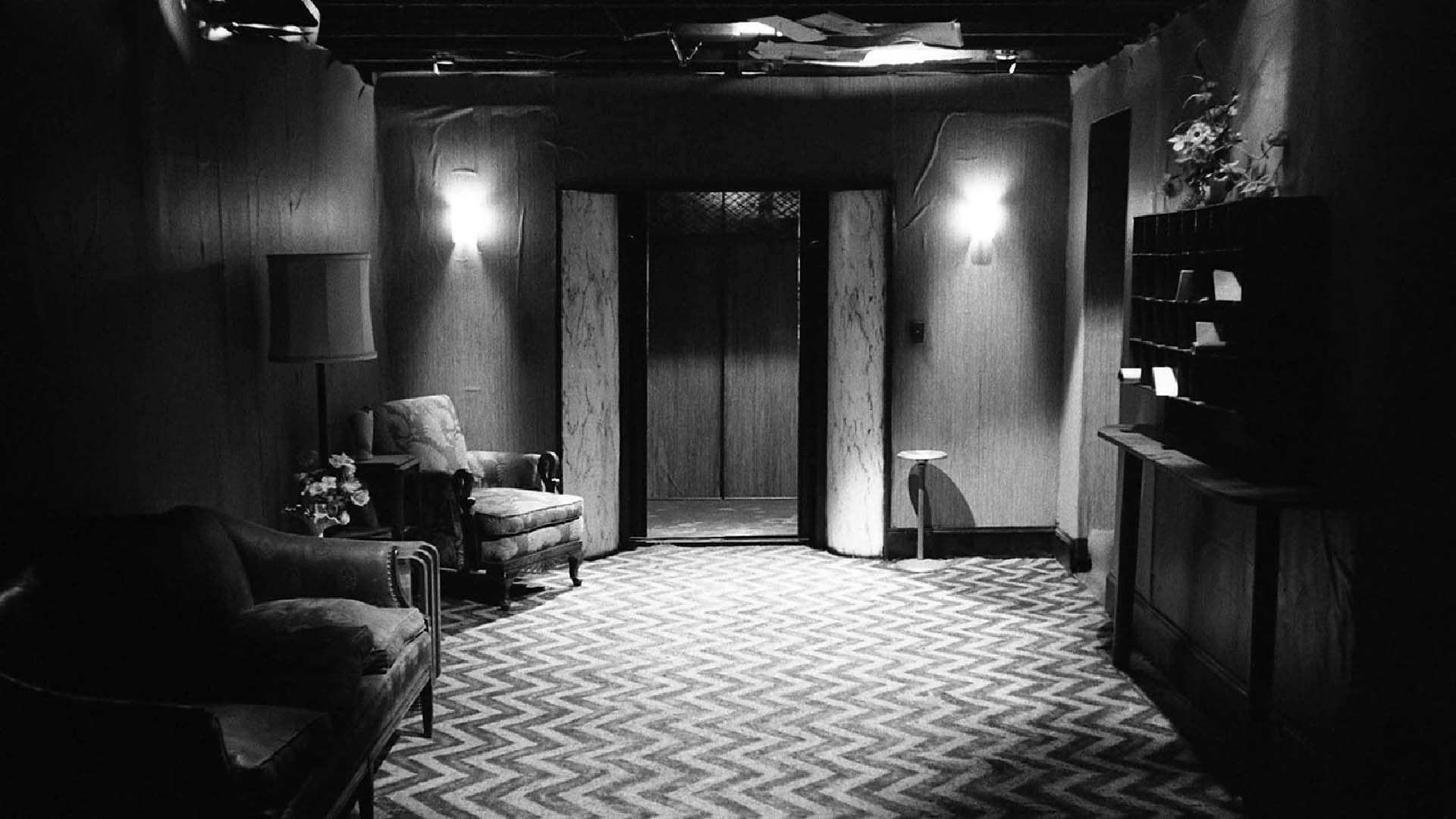
“May everything come true. May they believe. And may they laugh at their passions. For what they call passion is not really the energy of the sodiv, but merely friction between the sodiv and the outside world. But, above all, may they believe in themselves and become as helpless as children. For softness is great and strength is worthless. When a man is born, he is soft and pliable. When he dies, he is strong and hard. When a tree grows, it is soft and pliable. But when it’s dry and hard, it dies. Hardness and strength are death’s companions. Flexibility and softness are the embodiment of life. That which has become hard shall not triumph.”
Stalker leads Writer and Professor to a room that can fulfill their dreams. The room is located in the deepest part of the Zone, a place beyond time and space where paths and traps change on their own. Stalker is the chosen one to enter the Zone, and he leaves his wife and daughter to guide people through the Zone, but he does not enter the room. He is the one who can move between the two places, but at the same time, he is a liminal figure who never settles in either place. The dialog is an Stalker's monologue that paradoxically reveals the power of vulnerability.
「Stalker」
Stalker (Alexander Kaidanovsky)
Directed by Andrei Tarkovsky
1979

“I had a dream. In fact, it was the night I met you. In the dream, there was our world, and the world was dark because there weren’t any robins and the robins represented love. And for the longest time, there was just this darkness. And all of a sudden, thousands of robins were set free, and they flew down and brought this blinding light of love. And it seemed like that love would be the only thing that would make any difference. And it did. So, I guess it means there is trouble until the robins come.”
The ugly reality seen through Jeffrey and Sandy's innocent eyes is interspersed with scenes of disparate and unfamiliar elements. Sandy sees the bullfrog as a symbol of love, and hopes that by waiting for it, peace will come.
「Blue Velvet」
Stalker (Alexander Kaidanovsky)
Directed by Andrei Tarkovsky
1986

“Sure you could and yet many writers do everything in their power to insulate themselves from the common man, from where they live, from where they trade, from where they fight and love and converse and... and... So naturally their work suffers and regresses into empty formalism and... well, I'm spouting off again, but to put it in your language, the theatre becomes as phony as a three-dollar bill.”
Barton is a writer who admires ordinary people and writes about them. However, while struggling to write a screenplay in a hotel, Barton completes his masterpiece in one day when the unrealistic situation begins to unfold with Audrey's sudden death, and Charlie, the idealized ordinary person in the next room, becomes a murderer, killing all the cops and burning down the hotel. The director satirizes the irony of the relationship between the world and the artist through the sudden scenario in the second half of the film, which shows that the life of an ordinary person was also an idealized and empty formalism created in a claustrophobic hotel.
「Barton Fink」
Barton Fink (John Turturro)
Directed by Joel Coen, Ethan Coen
1991

“And what we say is the truth is what everybody accepts. Right, Owen? I mean, psychiatry: it’s the latest religion. We decide what’s right and wrong. We decide who’s crazy or not. I’m in trouble here. I’m losing my faith.”
The movie creates a closed narrative by linking the protagonist's dream to both the future and the past. It confuses the characters, who don't know whether the scene is a real future or a dream of an insane person, and it confuses the audience.
「Twelve Monkeys」
James Call (Bruce Willis)
Directed by Terry Gilliam
1995
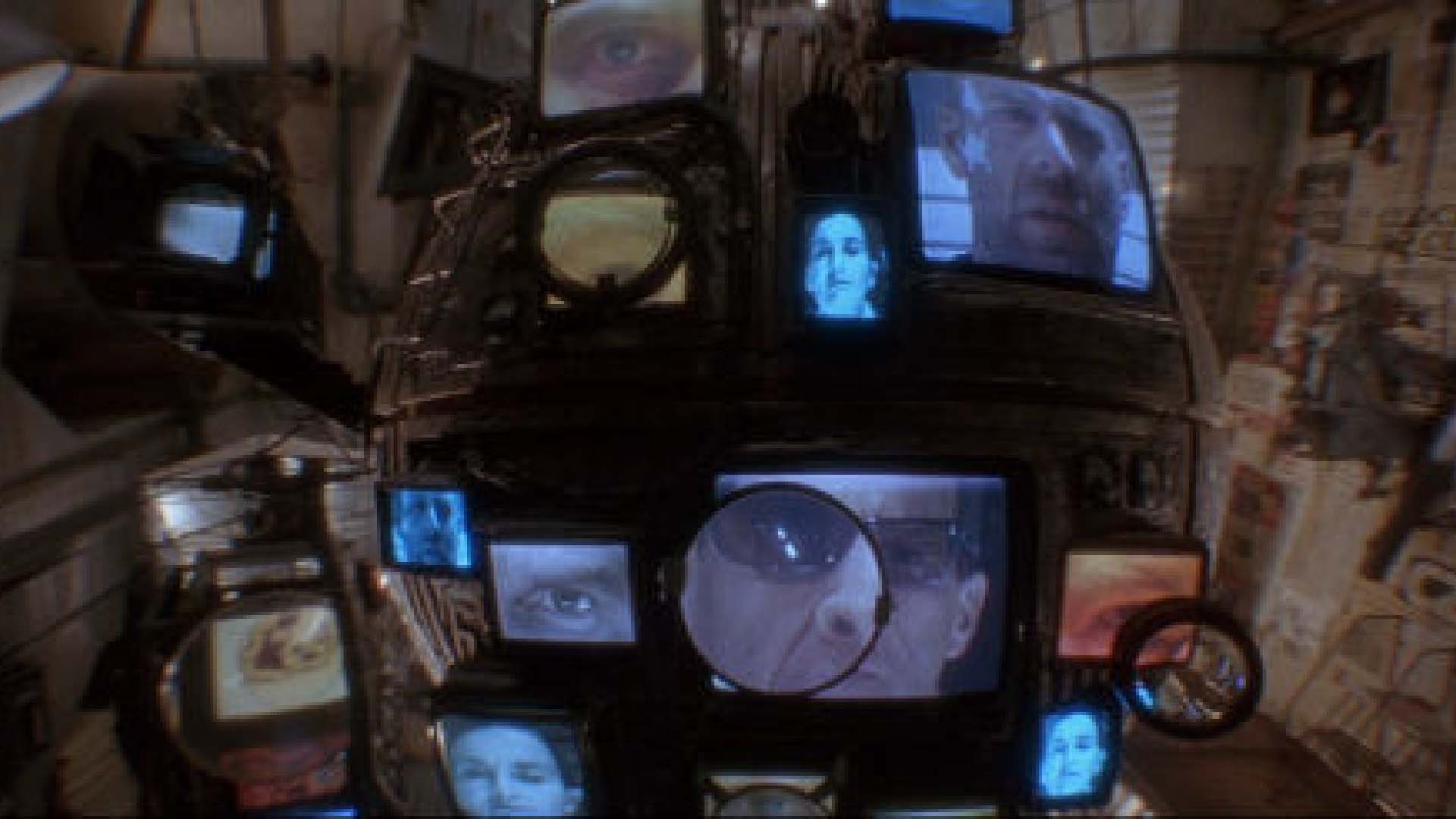
“Choose Life. Choose a job. Choose a career. Choose a family. Choose a fucking big television, choose washing machines, cars, compact disc players and electrical tin openers. Choose good health, low cholesterol, and dental insurance. Choose fixed interest mortgage repayments. Choose a starter home. Choose your friends. Choose leisurewear and matching luggage. Choose a three-piece suit on hire purchase in a range of fucking fabrics. Choose DIY and wondering who the fuck you are on Sunday morning. Choose sitting on that couch watching mind-numbing, spirit-crushing game shows, stuffing fucking junk food into your mouth. Choose rotting away at the end of it all, pissing your last in a miserable home, nothing more than an embarrassment to the selfish, fucked up brats you spawned to replace yourselves. Choose your future. Choose life... But why would I want to do a thing like that? I chose not to choose life.”
The film depicts the emptiness of Renton and his friends, who reject the conventional way of life that society has universally presented to them and wander around addicted to drugs. These characters, who symbolize marginalized youth, are torn between indulging in hedonistic nihilism and taking responsibility for their lives. Helpless, they ultimately choose to either fall to ruin, or become frustrated and mediocre.
「Trainspotting」
Mark Renton (Ewan McGregor)
Directed by Danny Boyle
1996

“A person is smart. People are dumb, panicky dangerous animals and you know it. Fifteen hundred years ago everybody knew the Earth was the center of the universe. Five hundred years ago, everybody knew the Earth was flat, and fifteen minutes ago, you knew that humans were alone on this planet. Imagine what you’ll know tomorrow.”
It reveals that everything is unpredictable, that nothing is immutable, and that being in a group makes you forget that.
「Men in Black」
K (Tommy Lee Jones)
Directed by Barry Sonnenfeld
1997
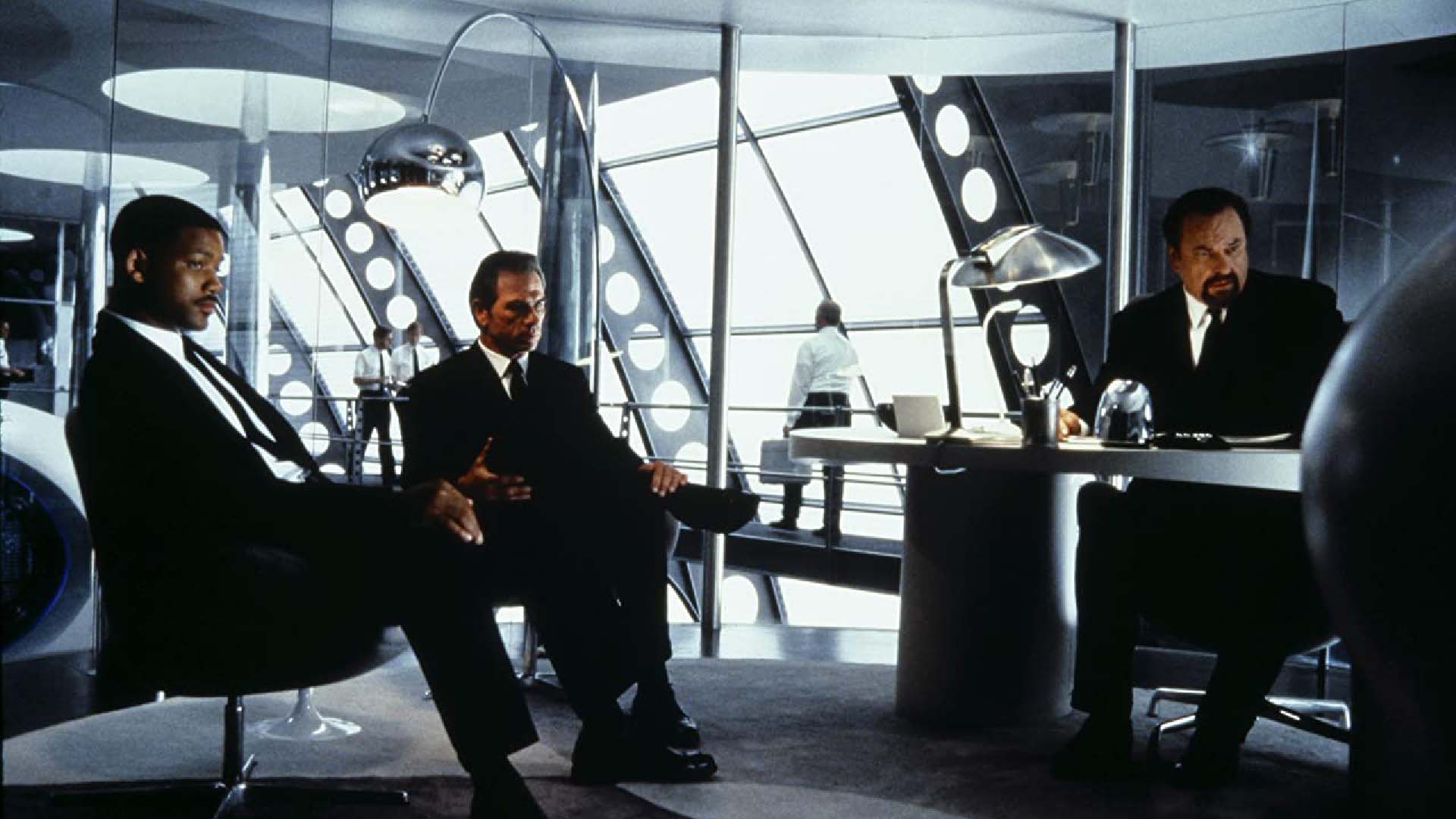
“Ed: Do you own a video camera?
Renee Madison: No. Fred hates them.
Fred Madison: I like to remember things my own way.
Ed: What do you mean by that?
Fred Madison: How I remembered them. Not necessarily the way they happened.”
The film fragments Fred's mind as he tries to deny and rationalize his memories, distorting time and space, people and events. In the film, Fred's self is divided into his imaginary characters, his actions are imputed to them, and the lines of truth are blurred. But the memories are indelibly videotaped deep within him, and he is left in a state of confusion.
「Lost Highway」
Ed (Louis Eppolito), Renee Madison (Patricia Arquette), Fred Madison (Bill Pullman)
Directed by David Lynch
1997

“Let me explain something to you. Um, I am not "Mr. Lebowski". You’re Mr. Lebowski. I’m the Dude. So that’s what you call me. You know, that or, uh, His Dudeness, or uh, Duder, or El Duderino if you’re not into the whole brevity thing.”
He refuses to be called by his real name, Jeffrey Levosky, and refers to himself as Dude. The movie starts with him getting involved in a small incident with his eponymous eponymous Lebowski, a misunderstanding that quickly escalates into a catastrophe. However, with no room for active intervention, everything is resolved unintentionally and accidentally, and he goes back to his life.
「The Big Lebowski」
The Dude (Jeff Bridges)
Directed by Joel Coen, Ethan Coen
1998

“There’s no more truth out there than there is in the world I created for you. The same lies. The same deceit. But in my world, you have nothing to fear.”
The movie centers on the confrontation between Truman, who is running away in search of freedom, and Christophe, who is trying to control the show. At the threshold of freedom, Christophe makes contradictory statements in an attempt to catch Truman in the act of leaving the world of lies and deceit he has created.
「Truman Show」
Truman Burbank (Jim Carrey)
Directed by Peter Weir
1998

“I mean, it raises all sorts of philosophical-type questions, you know... about the nature of self, about the existence of a soul. You know, am I me? Is Malkovich Malkovich? I had a piece of wood in my hand Maxine. I don’t have it any more. Where is it? Did it disappear? How could that be? Is it still in Malkovich’s head? I don’t know! Do you see what a metaphysical can of worms this portal is?”
The movie begins with Craig discovering a passageway into John Malkovich's head at the company, which is located in an unusual space called the 7 and 1/2 floor, between the 7th and 8th floors. As mentioned in the dialog, the characters begin to ask existential questions, showing the contradictions of trying to maintain their own form and consciousness while simultaneously becoming someone else to fulfill a lacking desire.
「Being John Malkovich」
Craig Schwartz (John Cusack)
Directed by Spike Jonze
1999
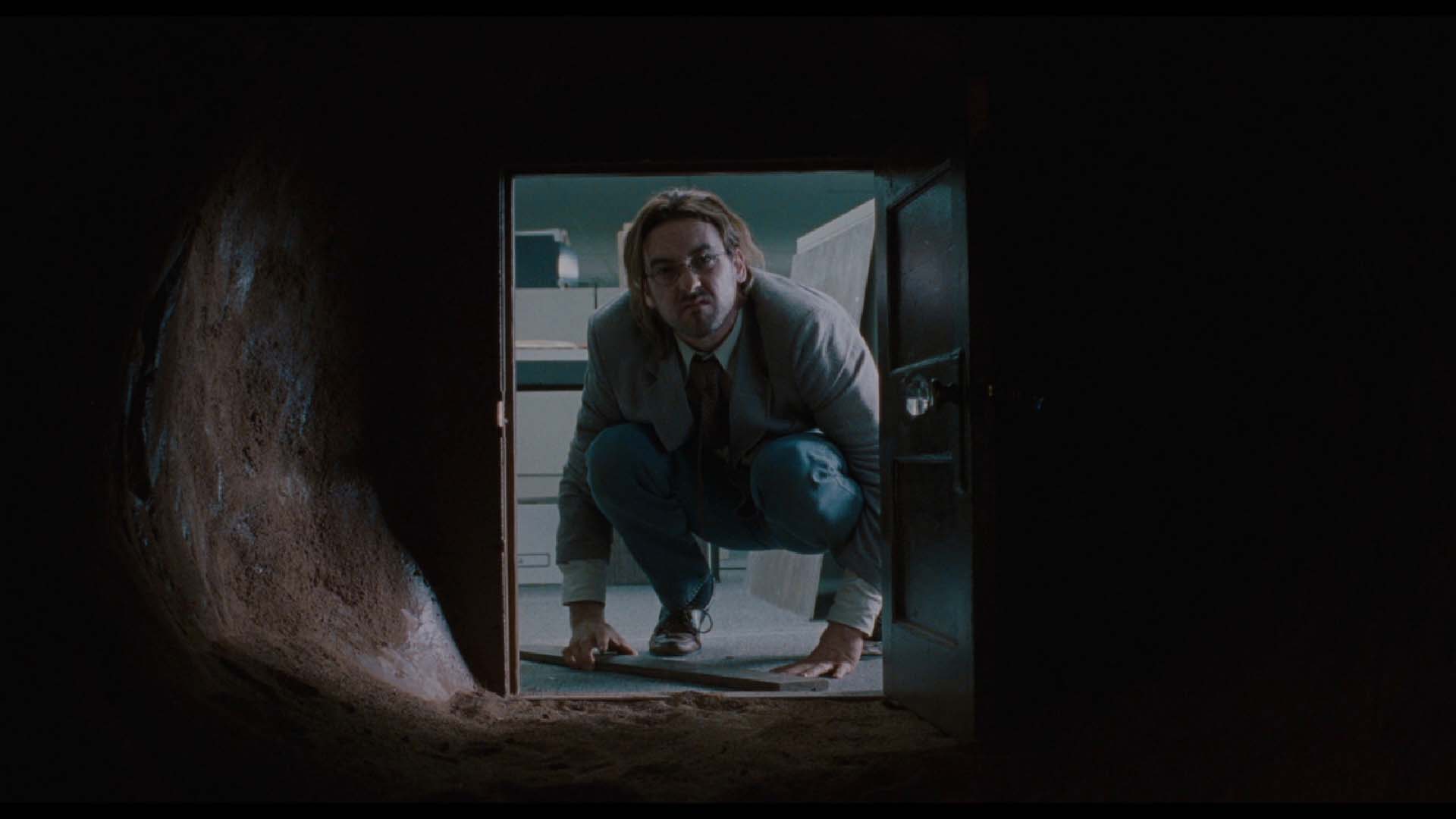
“You’re not your job. You’re not how much money you have in the bank. You’re not the car you drive. You’re not the contents of your wallet. You’re not your fucking khakis. You’re the all-singing, all-dancing crap of the world.”
From mocking the materialism of modern civilization that reduces humans to a byproduct of consumption to the rise of extreme alternatives through macho devices, the film reveals a sense of escape and resistance to the illusions of modern society.
「Fight Club」
Tyler Durden (Brad Pitt)
Directed by David Fincher
1999

“What is real? How do you define ‘real’? If you’re talking about what you can feel, what you can smell, what you can taste and see, then ‘real’ is simply electrical signals interpreted by your brain.”
Based on the dualistic worldview that our experience in the Matrix is an illusion and that we can reach the truth by escaping it, the movie explores the gap between sensation and reality.
「The Matrix」
Morpheus (Laurence Fishburne)
Directed by Lana Wachowski, Lilly Wachowski
1999

“I have to believe in a world outside my own mind. I have to believe that my actions still have meaning, even if I can’t remember them. I have to believe that when my eyes are closed, the world’s still there. Do I believe the world’s still there? Is it still out there?... Yeah. We all need mirrors to remind ourselves who we are. I’m no different.”
The film centers on a character with a unique situation: he suffers from amnesia due to an accident that causes him to lose his memory every 10 minutes. This separates his pre-accident existence from his post-accident existence, and the two coexist imperfectly through fragments of records such as notes, photographs, and tattoos.
「Memento」
Leonard Shelby (Guy Pearce)
Directed by Christopher Nolan
2000

“Un trombon "à coulisse". Un trombon "con sordina". Sient le son du trombon in sourdine. Hear le son... and mute it... drop it. It’s all recorded. No hay banda! It’s all a tape. Il n’est pas de orquestra. It is... an illusion.”
Later in the play, the characters Betty and Rita visit the "Silencio Theater." Silentio is the Latin word for silence. On stage, a musician plays a trombone and then takes his hand away, but the trombone continues to play. A singer collapses during a performance, but the song continues. In the dialog, the theater's magician reveals that the entire performance was recorded on tape. Betty, the idealized character, returns as "Diane," who is in the exact opposite situation. By doing so, Betty seems to be suggesting that Diane's events up to the middle of the play were all her fantasies. However, the director makes it impossible to separate fantasy and reality in a dichotomous way by introducing contradictory points that blur the boundaries between fantasy and reality, such as fantasy events affecting reality or future events affecting the past.
「Mulholland Drive」
The Magician (Richard Green)
Directed by David Lynch
2001

“What is a ghost? A tragedy condemned to repeat itself time and again? An instant of pain, perhaps. Something dead which still seems to be alive. An emotion suspended in time. Like a blurred photograph. Like an insect trapped in amber.”
The film shows the existence of ghosts from the perspective of the children in the closed space of the orphanage, indirectly revealing the horrors of war. The narrative of the ghost walks a precarious line between the historical setting of the Spanish Civil War and the narrative of the conflict between the characters, and the narration of the dialog repeats at the beginning and end of the film, reiterating the presence and symbolism of the ghost.
「El Espinazo Del Diablo」
Dr. Casares (Federico Luppi)
Directed by Guillermo del Toro
2001

“And it is said that the Princess returned to her father’s kingdom. That she reigned there with justice and a kind heart for many centuries. That she was loved by her people. And that she left behind small traces of her time on Earth, visible only to those who know where to look.”
The film weaves fairytale fantasies into the narrative of the Spanish Civil War and Ophelia's personal narrative. Ophelia, who can only dream of fairy tales amidst the harsh realities of war, is beautifully concluded with a fairytale ending.
「Pan’s Labyrinth」
Pan (Doug Jones)
Directed by Guillermo del Toro
2006

“Well... There is a vast network, right? An ocean of possibilities. I like dogs. I used to raise rabbits. I’ve always loved animals. Their nature. How they think. I have seen dogs reason their way out of problems. Watched them think through the trickiest situations. Do you have a couple of bucks I could borrow? I’ve got this damn landlord.”
The movie is deconstructed and multilayered to the point where the overall narrative is hard to grasp. Dialog suggests fragmented bits of information that are later revealed.
「Inland Empire」
Freddie Howard (Harry Dean Stanton)
Directed by David Lynch
2006
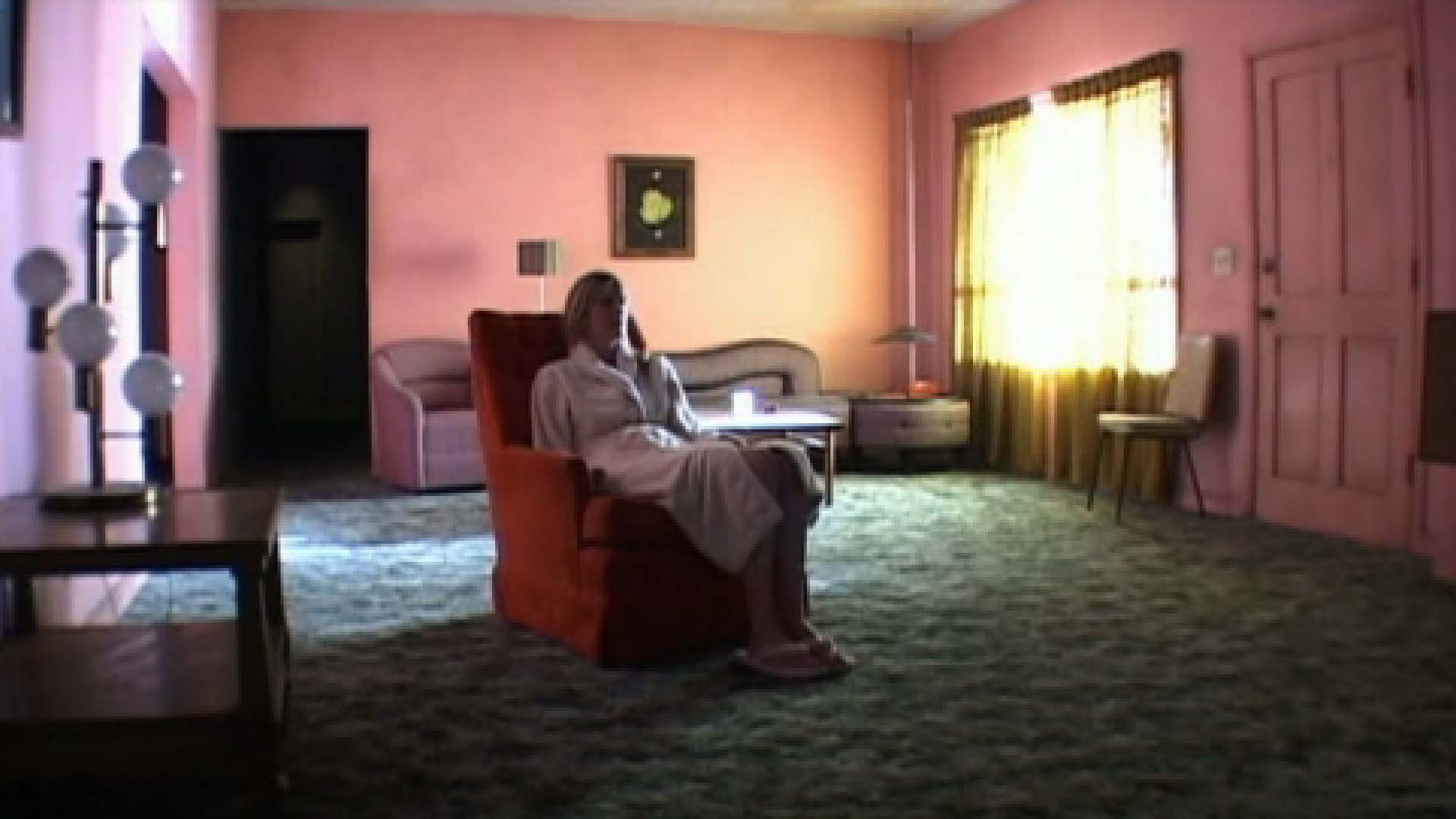
“What you got ain’t nothin’ new. This country’s hard on people. You can’t stop what’s coming. It ain’t all waiting on you. That’s vanity.”
The movie contrasts the new age converging on chaos with the helplessness of the older generation unable to keep up.
「No Country for Old Men」
Ellis (Barry Corbin)
Directed by Joel Coen, Ethan Coen
2007

“Oak trees grow to be hundreds of years old. They only have to produce one single tree every hundred years in order to propagate. May sound banal to you but it was a big thing for me to realize that when I was up here with Nic. The acorns fell on the roof vent. They kept falling and falling. And die and die. And I understood that everything that used to be beautiful about Eden was perhaps hideous. Now I could hear what I couldn’t hear before. The cry of all the things that are to die.”
Acorns fall like torrents of rain and rot, deer are stillborn, and young birds slip from their nests and fall prey to ants and hawks. The film depicts the Garden of Eden as a place of decay and annihilation, and nature implicitly reveals the horror of her sinfulness. As she looks into the abyss of her fear, she eventually assimilates and metastasizes into nature.
「Antichrist」
She (Charlotte Gainsbourg)
Directed by Lars von Trier
2009

“We all fear death and question our place in the universe. The artist’s job is not to succumb to despair, but to find an antidote for the emptiness of existence.”
The protagonist is accidentally transported back to Paris in the 1920s and meets the artists of the time. This is the answer he gives to Gertrude Stein when he meets her and shows her his novel.
「WMidnight in Paris」
Gertrude Stein (Kathy Bates)
Directed by Woody Allen
2011

“I do many, many things. I am a writer, a doctor, a nuclear physicist, a theoretical philosopher, but, above all, I am a man. A hopelessly inquisitive man, just like you.”
Freddie, the lost and wandering protagonist, sees Lancaster as a master who can fill his deficiencies, but when he discovers that Lancaster is also Freddie's alter ego in an imperfect mirror, he realizes that his deficiencies cannot be filled by others.
「Master」
Lancaster Dodd (Philip Seymour Hoffman)
Directed by Paul Thomas Anderson
2012

“We want to be free! We want to be free to do want we want to do! And we want to get loaded! And we want to have a good time! and that’s what we are gonna do!”
The movie moves from the present to the future, but unlike his classmates who conformed to the system, Gary tries to return to the memories of his past childhood, and his will to achieve ideals and freedom leads to repetitions and variations of past situations at the intersection of the two boundaries.
「The World’s End」
Gary King (Simon Pegg)
Directed by Edgar Wright
2013

“Llewyn Davis: Well, where were we?
Jean: You were calling me a careerist, and I was calling you a loser.
Llewyn Davis: Right, well, those are your categories. Jean: No, those are your categories.
Llewyn Davis: In my experience, the world’s divided into two kinds of people. Those who divide the world into two kinds of people...
Jean: And losers?”
The idealistic protagonist Lewin, who continues to play music, and the character Jin, who has chosen to compromise with reality, are pitted against each other, but the film never judges or pities its protagonists; it remains contemplative.
「Inside Llewyn Davis」
Llewyn Davis (Óscar Isaac), Jean (Carey Hannah Mulligan)
Directed by Joel Coen, Ethan Coen
2013

“Let’s read your fuckin’ review. “Callow.” Callow is a *label*. It’s just... “Lackluster.” That’s just a labels. Margin... marginalia. Are you kidding me? Sounds like you need penicillin to clear that up. That’s a label too. These are all just labels. You just label everything. That’s so fuckin’ lazy... You just... You’re a lazy fucker. You’re a lazy... You know what this is? You even know what that is? You don’t, You know why? Because you can’t see this thing if you don’t have to label it. You mistake all those little noises in your head for true knowledge.”
The film follows the narrative of Regan Thompson as he prepares for a play, with a single long take sequence running from beginning to end. The camera constantly follows Regan and the characters around him, creating a massive flow of space that confuses the audience by blurring the lines between the real space Regan is in and the fantasy space in his head.
「Birdman」
Riggan Thomson (Michael Keaton)
Directed by Alejandro González Iñárritu
2014

“Now the fact that you will turn into an animal if you fail to fall in love with someone during your stay here is not something that should upset you or get you down. Just think, as an animal you’ll have a second chance to find a companion. But, even then, you must be careful. you need to choose a companion that is a similar type of animal to you. A wolf and a penguin could never live together, nor could a camel and a hippopotamus. That would be absurd.”
Solo must stay in a hotel for 45 days to find a mate. If she doesn't find a mate, she must become an animal. Mates must have something in common, so a woman with a nosebleed can be paired with a man with a nosebleed, and a woman with myopia can be paired with a man with myopia. Run out of the hotel and into the woods, where only a solo can survive. Through its exaggerated portrayal, the movie satirizes a dichotomous society that forces people to belong nowhere.
「The Lobster」
Hotel Manager (Olivia Colman)
Directed by Yorgos Lanthimos
2015

“You do this, you do that. And in the meantime, life just passes by. But how are we supposed to hang on to moments? Now I sometimes sit there and remember how you learned to ride your bike...or how I once found you at a bus stop. But you only realize that afterwards. In the moment itself it’s not possible.”
Desperate to spend time with his busy daughter, Winfred disguises himself as Tony Edmunds and loiters around her. The friction between the two characters, who have diametrically opposed values, gradually intensifies, but over time, the daughter comes to accept her father's ways and seems to reconcile. However, it is impossible to fully understand each other, and the conflict is left unresolved at the end of the movie.
「Toni Erdmann」
Winfried Conradi (Peter Simonischek)
Directed by Maren Ade
2016

“I used to think this was the beginning of your story. Memory is a strange thing. It doesn’t work like I thought it did. We are so bound by time, by its order.”
By learning and thinking in an alien language, linguist Lewis is able to recall the cycle of past, present, and future, and the flashbacks (showing scenes from the past while telling a story) from the beginning of the movie turn out to be flashforwards (showing scenes from the future while telling a story). The dialog is repeated at the beginning and end of the movie, creating a closed-loop narrative. By featuring a character who transcends temporal boundaries and embraces the future, the film shows that the goodwill that comes from inclusion can break down barriers and create communication.
「The Arrival」
Louise Banks (Amy Adams)
Directed by Denis Villeneuve
2016

“You know, not long after my dad died, someone told me that I eat spaghetti the exact same way he did. They said what an extraordinary impression this fact had made on them. Look at the boy, look how he eats spaghetti. Exactly the same way his father did. He sticks his fork in. He twirls it around, around, around, around, around. Then he sticks it in his mouth. At that time, I thought I was the only one who ate spaghetti that way. Me and my dad. Later, of course, I found out that everyone eats spaghetti the exact same way. Exact same way, exact same way. This made me very upset. Very upset. Maybe even, um, more upset than when they told me he was dead. My dad.”
Martin grieves more for the loss of solidarity in his relationship with his father than for his father's death. Martin then shifts the object of his revenge from Stephen to the solidarity of Stephen's family.
「The Killing of a Sacred Deer」
Martin (Barry Keoghan)
Directed by Yorgos Lanthimos
2017

“Englishman: Mr. Thorpe up there, a typical case. I told him the story of the Midnight Caller. “Someone is outside, knocking.” “No, don’t open it, mother. What living thing could be out in such a storm?” You know the story but people can’t get enough of them, like little children. Because, well, they connect the stories to themselves, I suppose, and we all love hearing about ourselves, so long as the people in the stories are us, but not us. Not us in the end, especially. The Midnight Caller gets him… never me. I’ll live forever. I must say... it's always interesting watching them after Clarence has worked his art. Watching them negotiate... the passage.
Frenchman: Passage?
Englishman: From here to there. To the other side. Watching them try to make sense of it, as they pass to that other place. I do like looking into their eyes as they try to make sense of it. I do, I do.
Trapper: Try to make sense of what?
Englishman: All of it.
Lady: And do they ever... succeed?
Englishman: How would I know? I'm only watching!”
The dialog is a conversation between the two bounty hunters and the passengers in the carriage, in which they discuss their inability to come to terms with their sudden death. This can be seen as a reverse gaze from the director to the audience, who are trying to find meaning in the movie by borrowing the words of the bounty hunter.
「The Ballad of Buster Struggs」
Englishman (Jonjo O'Neill), Irishman (Saul Rubinek), Trapper (Chelcie Ross), Lady (Tyne Daly)
Directed by Joel Coen, Ethan Coen
2018
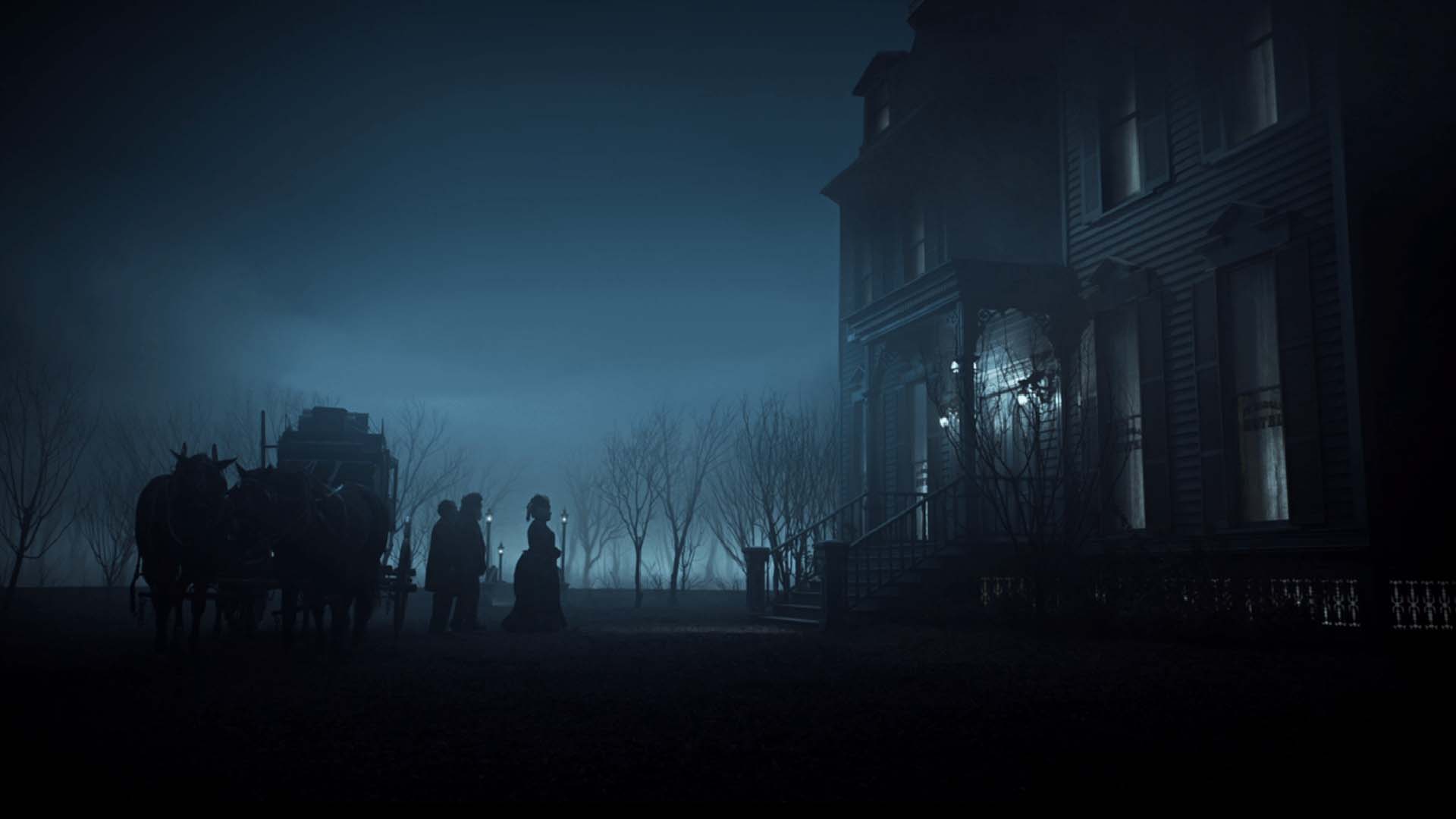
“Mythology is what we knew back then. Science is what we know so far. Sooner or later, our creation stories are replaced by the narratives of science. Painstaking science. And all Gods and Monsters outlive their original purpose - and are reduced to metaphor.”
The dialog begins with a conversation about the conflict between myth and science. The film follows the progression of Alithea, a rational, real-world narrator, to Genie, an irrational, story-world spirit, and the fact that the entire narrative of the film is realized through the story between these two characters alone is a metaphor for how the act of storytelling itself functions as a passage from the past to the present.
「Three Thousand Years of Longing」
Alithea Binnie (Tilda Swinton)
Directed by George Miller
2022
































